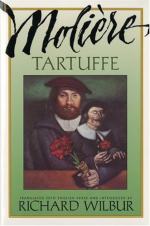|
This section contains 6,439 words (approx. 22 pages at 300 words per page) |

|
SOURCE: “Tartuffe, Representation and Difference,” in Papers on French Seventeenth Century Literature, Vol. XVI, No. 30, 1989, pp. 76-93.
The following essay, McKenna discusses Molière's Tartuffe, focusing on misinterpretations embodied within the work that serve to entrap its audience.
Molière's Le Tartuffe, ou l'Imposteur is a play about sex, religion and politics, the canonical topics of adult conversation. It affords the requisite opportunities for a radical critique of desire, the sacred, and power, the canonical topics of our demystifying fervor—with which we often remystify readers by the use of such terms as theophallogocentrism. Moreover, it is a text whose misunderstanding-misinterpretation is inscribed within it, thereby deploying tactics of entrapment (of reader or spectator) which are deemed by many as indispensable to strategies identified as deconstructive. Finally, it is a text in which psychological and rhetorical structures are imbricated, mutually implicated and complicated, so that the allegory of...
|
This section contains 6,439 words (approx. 22 pages at 300 words per page) |

|


